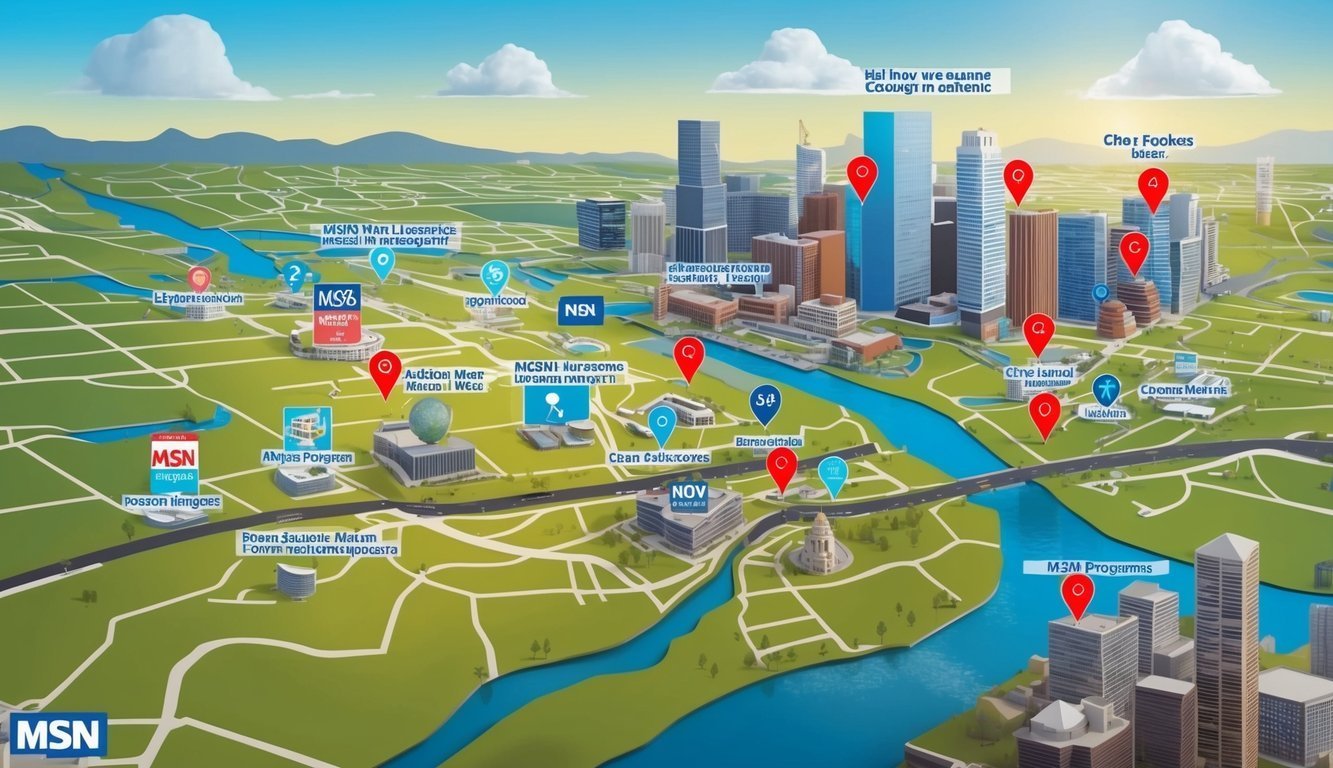If you are considering advancing your nursing career, looking into MSN programs near you is a great step. These programs prepare you for leadership roles and specialized positions in healthcare, such as Nurse Practitioners and Advanced Practice Registered Nurses.
With many options available, including online programs and part-time study, you can find a path that fits your lifestyle and professional goals.
As you explore various Master of Science in Nursing options, it’s important to consider factors like accreditation and the types of specializations offered.
From critical care to pediatrics, different concentrations can tailor your education to meet the demands of today’s healthcare environment.
Understanding the admission process and what each program requires can also help you make an informed decision.
Financial considerations are crucial when choosing an MSN program.
Many schools offer resources and financial aid to support you through your studies.
With the right information, you can find a program that not only elevates your expertise but also fits within your budget.
Key Takeaways
- MSN programs prepare you for advanced nursing roles.
- Specializations vary, allowing for tailored education paths.
- Financial aid options are available to support your studies.
Exploring MSN Degree Types and Specializations
Choosing a Master of Science in Nursing (MSN) program involves understanding the types of degrees and specializations available.
Each path offers unique training and career opportunities tailored to different interests and goals.
Direct-Entry MSN Programs for Non-Nursing Graduates
If you hold a bachelor’s degree in a field other than nursing, a Direct-Entry MSN program may be ideal for you.
These programs allow you to transition into nursing without needing to first obtain a Bachelor of Science in Nursing (BSN).
Typically lasting 2 to 3 years, Direct-Entry MSN programs prepare you for the role of a registered nurse (RN) while also advancing your education.
You will complete a combination of coursework and clinical training.
Upon graduating, you can pursue various specializations, such as becoming a Family Nurse Practitioner (FNP) or a Psychiatric Mental Health Nurse Practitioner.
This path expands your scope of practice and opens up diverse career options.
For more information, check the NursingProcess.org article.
Specializations: FNP, Pediatric, Psychiatric-Mental Health, and More
When pursuing an MSN, you can choose from several specializations to focus your career.
Some of the most popular options include:
- Family Nurse Practitioner (FNP): Offers primary care across all ages.
- Pediatric Nurse Practitioner: Focuses on the healthcare needs of children.
- Psychiatric-Mental Health Nurse Practitioner: Provides mental health support and treatment.
Each specialization has unique coursework and clinical requirements.
For instance, to become an FNP, you will study topics like advanced health assessment and pathophysiology.
You can explore more about popular MSN degrees in this NurseJournal.org article.
The Role of Clinical Hours in Specialized Training
Clinical hours play a crucial role in MSN programs, especially for specialized training.
Each specialization requires a specific number of clinical hours to ensure you gain practical experience.
For example, to become a Psychiatric Mental Health Nurse Practitioner, you might need over 500 clinical hours focusing on mental health care.
Hands-on training in diverse settings enhances your skills and prepares you for real-world challenges.
While pursuing your MSN, you’ll engage in Nursing Theory, which underpins the practice of nursing.
Understanding these theories is vital for applying knowledge effectively in clinical settings.
Ensure to check out programs that offer substantial clinical experiences to maximize your training.
Paths to an MSN: Education and Licensure Prerequisites

To pursue a Master of Science in Nursing (MSN), you need to understand the educational pathways and specific requirements leading to this advanced degree.
This section outlines the transition from RN to MSN, the prerequisites for admission, and the necessary licensure.
From RN to MSN: Bridging Programs
If you already hold an RN license, you can consider bridging programs tailored for you.
These programs typically cater to RNs with a Bachelor of Science in Nursing (BSN) but also offer pathways for those without a BSN.
Bridging programs often require:
- Completion of prerequisite courses
- A minimum GPA, often around 3.0
- Letters of recommendation
Some popular online MSN programs allow you to earn your degree while working.
For example, programs like those at Fort Hays State University offer flexible options that are fully online, making it easier for you to balance work and study.
Prerequisites for MSN Admission
Before applying to an MSN program, you must meet certain admission requirements.
These can vary by program but generally include:
- A valid RN license
- A Bachelor of Science in Nursing or similar degree
- Completion of specific prerequisite courses, which may include subjects like pharmacology and advanced health assessment
Many schools also require an interview and a personal statement.
Ensuring that you have a strong academic record will help your application stand out.
Checking programs such as Johns Hopkins University can provide you more insights into specific requirements.
NCLEX and RN Licensure Requirements
Obtaining your RN license is a crucial step in your nursing career.
After completing an accredited nursing program, you must pass the NCLEX-RN exam, which is a standardized test.
Key points regarding NCLEX-RN:
- The current pass rate is about 86% nationally.
- Many MSN programs require a valid NCLEX-RN pass before application.
After passing, you’re licensed to practice as a Registered Nurse (RN).
This licensure is essential for advancing toward an MSN, as it confirms your capability to handle nursing responsibilities in various settings.
Online resources like Nurse.org can aid in understanding licensure obligations and the career advantages of obtaining an MSN.
Accreditation and Academic Quality of MSN Programs

When choosing an MSN program, it’s crucial to consider accreditation and the academic quality of the institution.
Accreditation ensures that the program meets strict educational standards, which affects your degree’s value and your future career options.
Understanding CCNE and ACEN Accreditation
Accreditation bodies like the Commission on Collegiate Nursing Education (CCNE) and the Accreditation Commission for Education in Nursing (ACEN) evaluate nursing programs.
-
CCNE Accredited Programs: Programs accredited by CCNE are recognized for their high academic standards and commitment to improving the quality of healthcare education. Institutions such as Johns Hopkins University are notable examples.
-
ACEN Accredited Programs: ACEN ensures that nursing programs meet rigorous quality criteria, often focusing on both academic and clinical experiences.
Choosing a program with either of these accreditations enhances your educational experience and prepares you for licensure exams, ensuring that you receive quality education.
Assessing Program Reputation and Graduation Rates
The reputation of a nursing program can significantly impact your education and career.
Look for schools that are well-regarded in the nursing community.
Here are some key things to consider:
-
Reputation: Programs like Chamberlain University are recognized for their innovative approaches and strong graduate placements.
-
Graduation Rates: High graduation rates indicate that students are satisfied with their programs and receive the support they need. Research specific program rates to gauge academic success.
You can find valuable information about these aspects on nursing program review sites or academic resources.
Prioritizing accredited and reputable programs will help ensure you are making a wise investment in your future.
Admission Process and Selecting the Right MSN Program
Navigating the admission process for a Master of Science in Nursing (MSN) program is crucial to your success.
You need to carefully evaluate admission requirements, acceptance rates, and the length of the program.
Evaluating Admission Requirements and Acceptance Rates
Before applying, review the admission requirements for each program.
Common requirements include:
- Bachelor’s Degree: A degree in nursing or a related field is often needed.
- GPA: Many schools look for a minimum GPA, typically around 3.0.
- Letters of Recommendation: Expect to submit 2-3 letters from professionals.
- Personal Statement: Write about your career goals and motivations.
Acceptance rates can vary greatly between programs.
Some schools may be more competitive than others.
Programs with lower acceptance rates may indicate higher demand and prestige.
Research the specific statistics for schools you’re interested in to assess your chances effectively.
The Importance of Nursing School and Program Length
Choosing the right nursing school is essential.
Look for institutions that are accredited and have good reputations.
Factors to consider include:
- Program Format: Some programs offer online MSN options, providing flexibility.
- Specializations Available: Determine if they offer the specialty you want.
Program length varies.
An MSN may take anywhere from 1 to 3 years to complete, depending on whether you attend full-time or part-time.
Consider how your schedule fits into the program’s timeline.
If you’re considering a Direct Entry MSN Program, you may finish more quickly, but ensure you’re prepared for the rigors of nursing training.
Assess the transfer credit policies as well, since they can affect your overall duration in the program.
Financial Considerations for MSN Candidates

Financing your Master of Science in Nursing (MSN) can significantly impact your educational journey.
You should be aware of scholarships, financial aid opportunities, and how your future salary can affect your ability to manage these costs.
Scholarships and Financial Aid Opportunities
Numerous scholarships are available specifically for nursing students.
Consider exploring options offered by universities, nursing organizations, and local health care facilities.
You may qualify for merit-based awards or need-based scholarships.
Types of Aid to Explore:
- Federal Grants: Programs like the Pell Grant can provide substantial financial assistance.
- State Scholarships: Many states offer scholarships to nursing students, which can help reduce overall costs.
- Private Scholarships: Organizations such as the American Association of Colleges of Nursing (AACN) and local foundations may have funds available.
Make sure you fill out the Free Application for Federal Student Aid (FAFSA) to access these options and find out what you might be eligible for.
Understanding Cost vs. Career Salary Potential
Before you commit to a program, assess the total cost of obtaining your MSN.
Consider tuition, fees, and other expenses against your expected salary post-graduation.
Average Salary Potential:
| MSN Role | Median Salary |
|---|---|
| Nurse Practitioner | $129,480 |
| Nurse Anesthetist | $189,190 |
| Nurse Midwife | $118,000 |
By comparing these figures, you can evaluate the return on investment for your education.
For instance, the potential salary for an MSN graduate often exceeds that of traditional RNs, indicating solid career opportunities.
You should factor in the timeline for earning your degree.
Also, consider how quickly you can enter the workforce to maximize your earning potential.
Frequently Asked Questions
When considering an MSN program, you might have several questions about requirements, accreditation, and program details.
This section addresses key inquiries you may have when exploring your options for pursuing this degree.
What are the requirements for enrolling in an MSN program?
Eligibility for MSN programs often includes holding a bachelor’s degree in nursing or a related field.
Some programs may accept candidates with degrees in other areas, but these usually require completing specific prerequisite courses.
How can I find accredited MSN programs near my location?
You can locate accredited MSN programs by visiting sites like the Commission on Collegiate Nursing Education.
They provide a list of accredited programs you can search by state or city.
What are the differences between Direct Entry MSN programs and traditional MSN programs?
Direct Entry MSN programs are designed for students who do not have a nursing background.
They typically include foundational nursing courses alongside advanced topics.
Traditional MSN programs usually require you to be a registered nurse before applying.
How long does it typically take to complete an MSN degree?
Most MSN programs take between 1.5 to 3 years to complete, depending on whether you attend full-time or part-time.
Programs may vary in length based on their specific requirements and your enrollment status.
Is it possible to pursue an MSN degree without prior RN licensure?
Yes, some programs allow individuals without RN licensure to enroll, particularly Direct Entry MSN programs.
These programs provide the nursing education required prior to obtaining licensure.
Which factors should I consider when choosing an MSN program?
When choosing an MSN program, you should consider factors such as accreditation, curriculum focus, faculty credentials, and flexibility in scheduling.
Also, think about the program’s clinical placement opportunities and the support services available to students.

